University Business Law Report: Contract, Partnership, and Company Law
VerifiedAdded on 2020/04/13
|12
|2247
|38
Report
AI Summary
This business law report analyzes four key legal issues. The first issue determines the existence of a partnership between John and Julia, examining the Partnership Act 1963 (Cth) and relevant case law. The second issue concerns the liability of J&J Pty Ltd to pay Yoga Direct for an outstanding invoice, applying the Corporations Act 2001 (Cth) and the rights of companies to enter contracts. The third issue explores whether ADJ can claim an injunction against House Galore for soliciting clients and submitting tenders, focusing on restrictive covenants and their enforceability. Finally, the report addresses whether a house owned by House Galore is bound to a mortgage created by a director, applying the Corporations Act and the assumptions third parties can make when dealing with companies. The report provides detailed analysis of the legal principles and their application to the specific facts of each case.
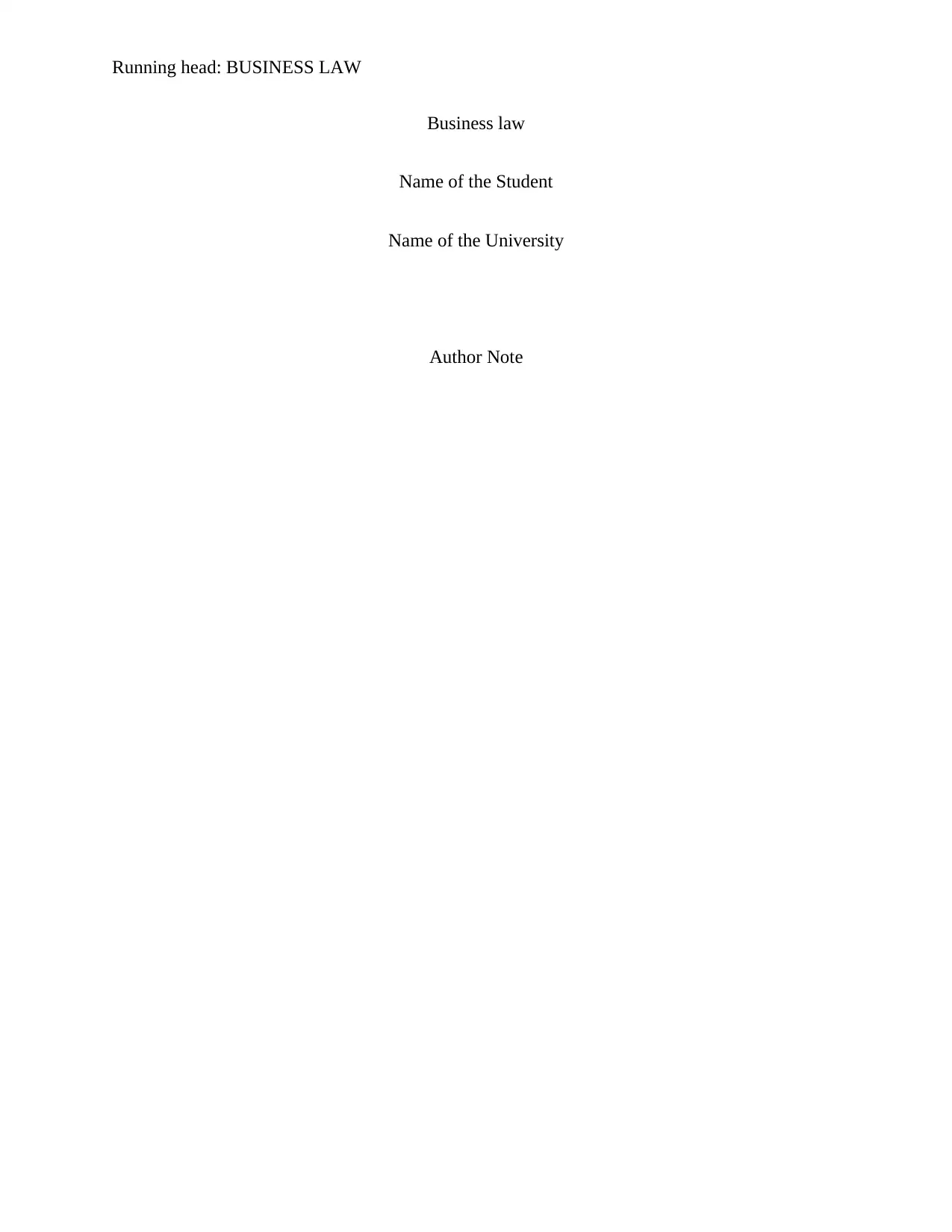
Running head: BUSINESS LAW
Business law
Name of the Student
Name of the University
Author Note
Business law
Name of the Student
Name of the University
Author Note
Paraphrase This Document
Need a fresh take? Get an instant paraphrase of this document with our AI Paraphraser
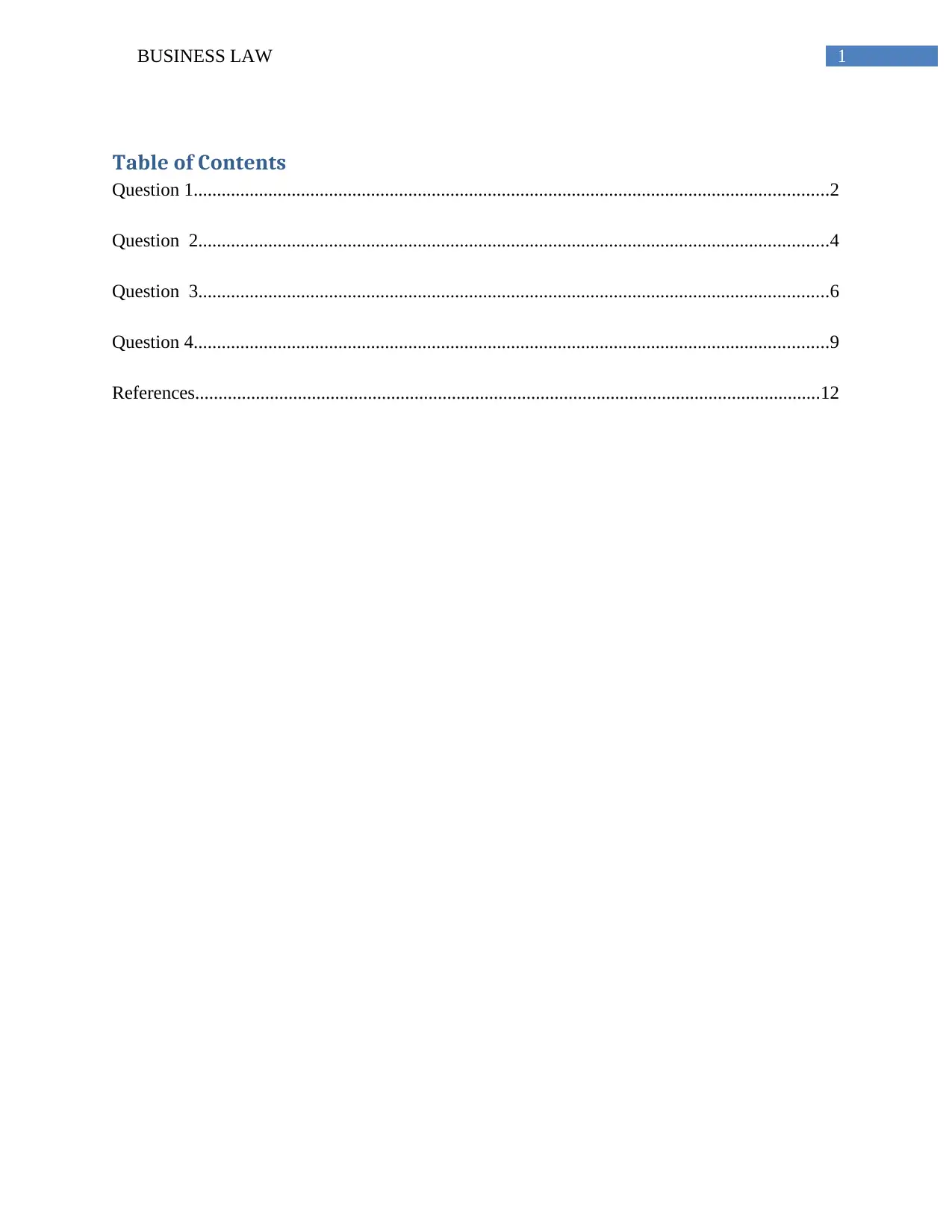
1BUSINESS LAW
Table of Contents
Question 1........................................................................................................................................2
Question 2.......................................................................................................................................4
Question 3.......................................................................................................................................6
Question 4........................................................................................................................................9
References......................................................................................................................................12
Table of Contents
Question 1........................................................................................................................................2
Question 2.......................................................................................................................................4
Question 3.......................................................................................................................................6
Question 4........................................................................................................................................9
References......................................................................................................................................12
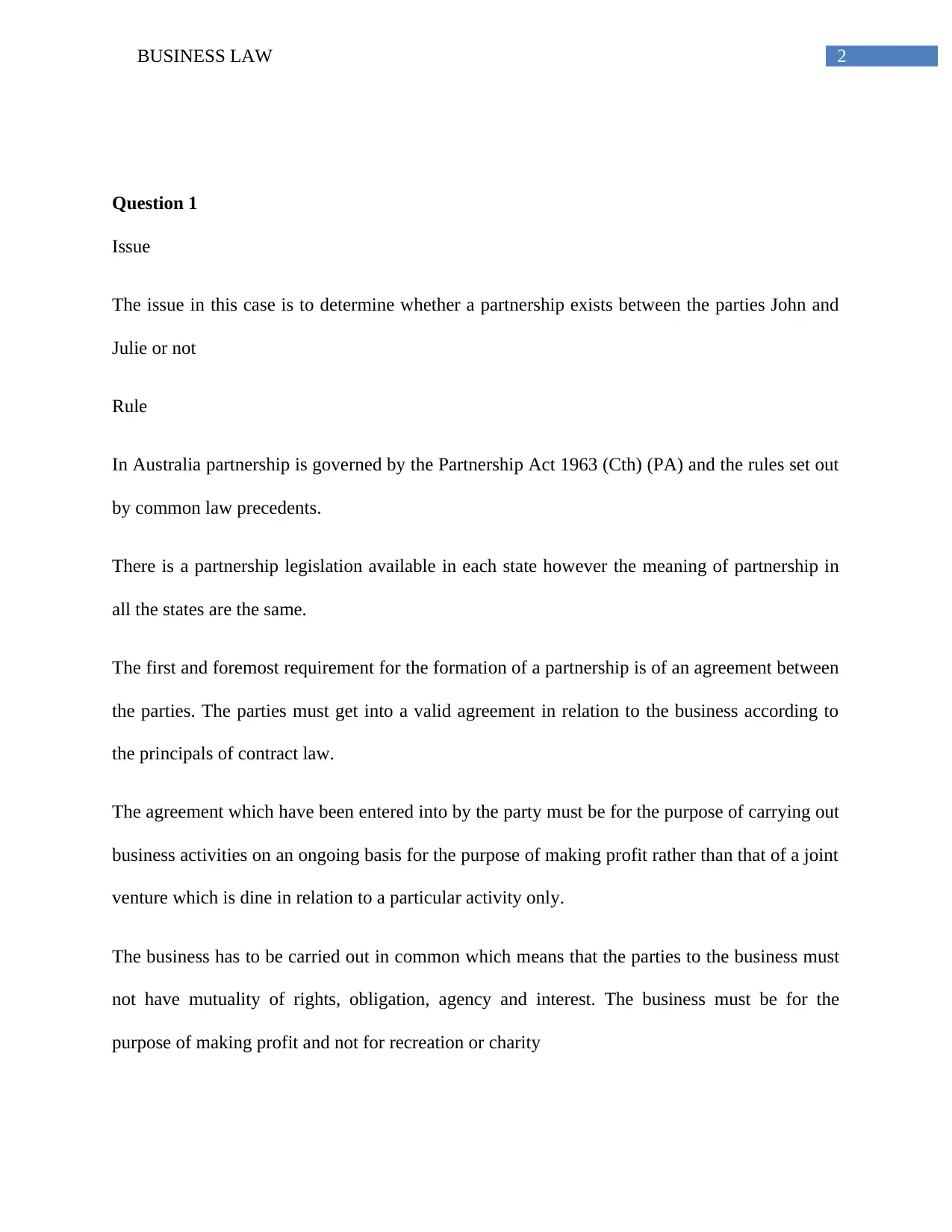
2BUSINESS LAW
Question 1
Issue
The issue in this case is to determine whether a partnership exists between the parties John and
Julie or not
Rule
In Australia partnership is governed by the Partnership Act 1963 (Cth) (PA) and the rules set out
by common law precedents.
There is a partnership legislation available in each state however the meaning of partnership in
all the states are the same.
The first and foremost requirement for the formation of a partnership is of an agreement between
the parties. The parties must get into a valid agreement in relation to the business according to
the principals of contract law.
The agreement which have been entered into by the party must be for the purpose of carrying out
business activities on an ongoing basis for the purpose of making profit rather than that of a joint
venture which is dine in relation to a particular activity only.
The business has to be carried out in common which means that the parties to the business must
not have mutuality of rights, obligation, agency and interest. The business must be for the
purpose of making profit and not for recreation or charity
Question 1
Issue
The issue in this case is to determine whether a partnership exists between the parties John and
Julie or not
Rule
In Australia partnership is governed by the Partnership Act 1963 (Cth) (PA) and the rules set out
by common law precedents.
There is a partnership legislation available in each state however the meaning of partnership in
all the states are the same.
The first and foremost requirement for the formation of a partnership is of an agreement between
the parties. The parties must get into a valid agreement in relation to the business according to
the principals of contract law.
The agreement which have been entered into by the party must be for the purpose of carrying out
business activities on an ongoing basis for the purpose of making profit rather than that of a joint
venture which is dine in relation to a particular activity only.
The business has to be carried out in common which means that the parties to the business must
not have mutuality of rights, obligation, agency and interest. The business must be for the
purpose of making profit and not for recreation or charity
⊘ This is a preview!⊘
Do you want full access?
Subscribe today to unlock all pages.

Trusted by 1+ million students worldwide
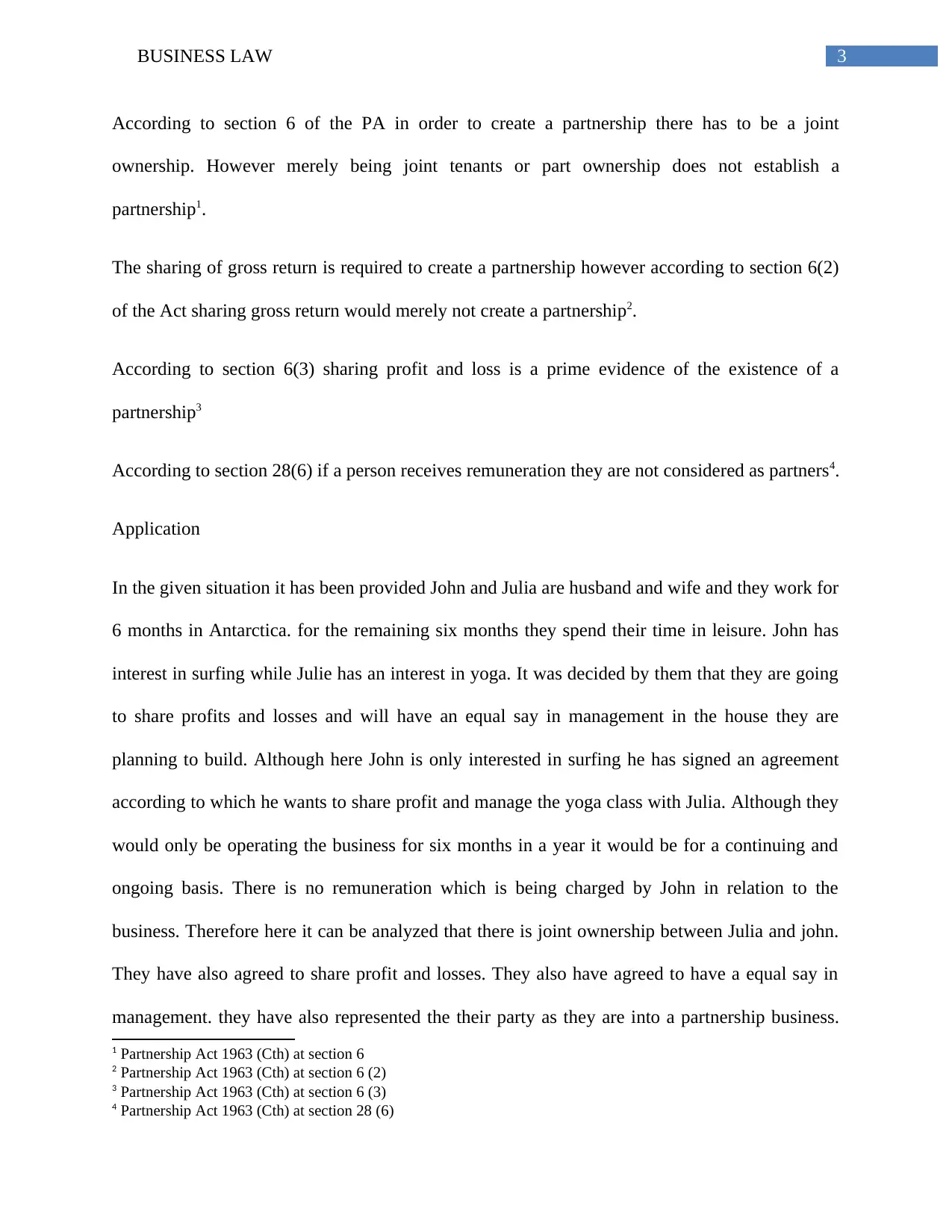
3BUSINESS LAW
According to section 6 of the PA in order to create a partnership there has to be a joint
ownership. However merely being joint tenants or part ownership does not establish a
partnership1.
The sharing of gross return is required to create a partnership however according to section 6(2)
of the Act sharing gross return would merely not create a partnership2.
According to section 6(3) sharing profit and loss is a prime evidence of the existence of a
partnership3
According to section 28(6) if a person receives remuneration they are not considered as partners4.
Application
In the given situation it has been provided John and Julia are husband and wife and they work for
6 months in Antarctica. for the remaining six months they spend their time in leisure. John has
interest in surfing while Julie has an interest in yoga. It was decided by them that they are going
to share profits and losses and will have an equal say in management in the house they are
planning to build. Although here John is only interested in surfing he has signed an agreement
according to which he wants to share profit and manage the yoga class with Julia. Although they
would only be operating the business for six months in a year it would be for a continuing and
ongoing basis. There is no remuneration which is being charged by John in relation to the
business. Therefore here it can be analyzed that there is joint ownership between Julia and john.
They have also agreed to share profit and losses. They also have agreed to have a equal say in
management. they have also represented the their party as they are into a partnership business.
1 Partnership Act 1963 (Cth) at section 6
2 Partnership Act 1963 (Cth) at section 6 (2)
3 Partnership Act 1963 (Cth) at section 6 (3)
4 Partnership Act 1963 (Cth) at section 28 (6)
According to section 6 of the PA in order to create a partnership there has to be a joint
ownership. However merely being joint tenants or part ownership does not establish a
partnership1.
The sharing of gross return is required to create a partnership however according to section 6(2)
of the Act sharing gross return would merely not create a partnership2.
According to section 6(3) sharing profit and loss is a prime evidence of the existence of a
partnership3
According to section 28(6) if a person receives remuneration they are not considered as partners4.
Application
In the given situation it has been provided John and Julia are husband and wife and they work for
6 months in Antarctica. for the remaining six months they spend their time in leisure. John has
interest in surfing while Julie has an interest in yoga. It was decided by them that they are going
to share profits and losses and will have an equal say in management in the house they are
planning to build. Although here John is only interested in surfing he has signed an agreement
according to which he wants to share profit and manage the yoga class with Julia. Although they
would only be operating the business for six months in a year it would be for a continuing and
ongoing basis. There is no remuneration which is being charged by John in relation to the
business. Therefore here it can be analyzed that there is joint ownership between Julia and john.
They have also agreed to share profit and losses. They also have agreed to have a equal say in
management. they have also represented the their party as they are into a partnership business.
1 Partnership Act 1963 (Cth) at section 6
2 Partnership Act 1963 (Cth) at section 6 (2)
3 Partnership Act 1963 (Cth) at section 6 (3)
4 Partnership Act 1963 (Cth) at section 28 (6)
Paraphrase This Document
Need a fresh take? Get an instant paraphrase of this document with our AI Paraphraser
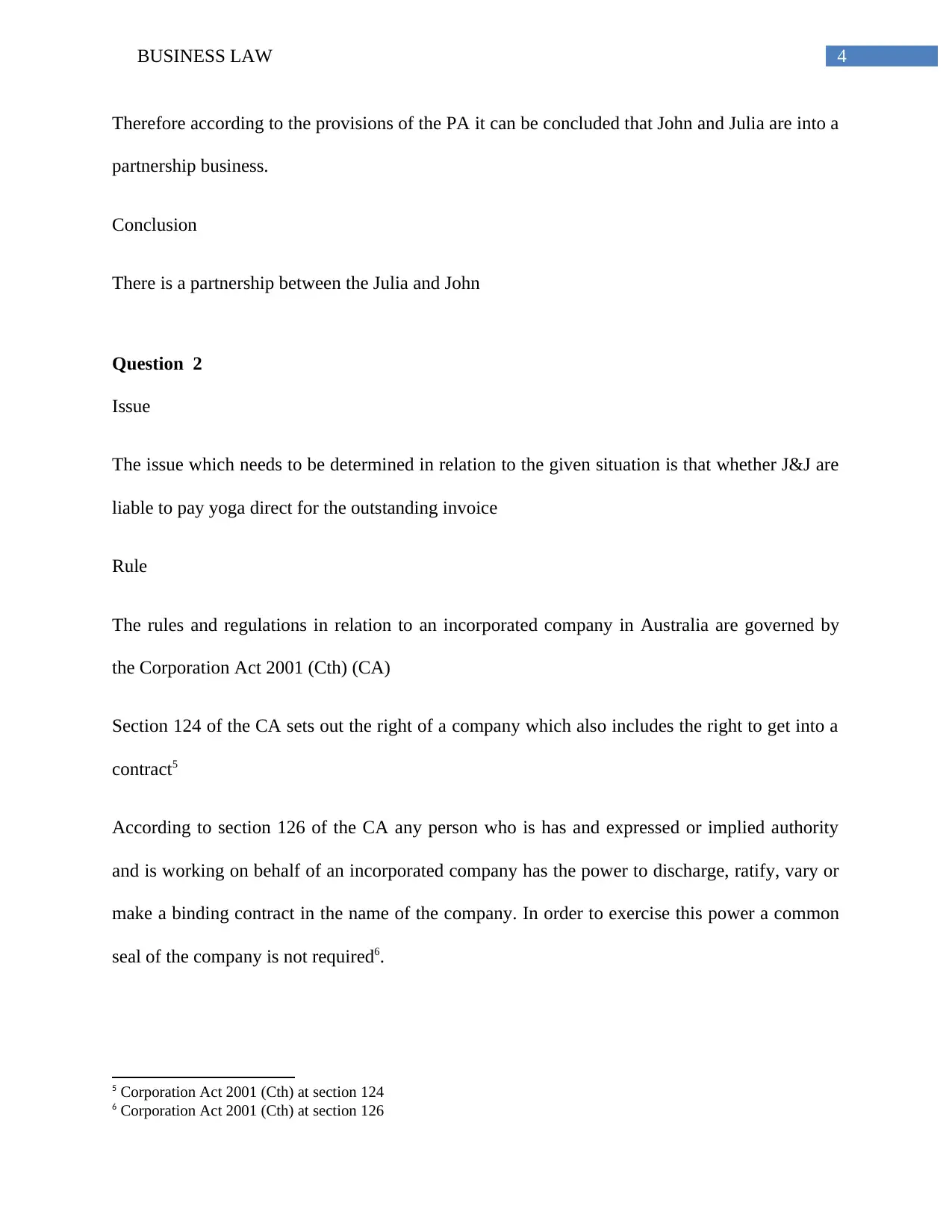
4BUSINESS LAW
Therefore according to the provisions of the PA it can be concluded that John and Julia are into a
partnership business.
Conclusion
There is a partnership between the Julia and John
Question 2
Issue
The issue which needs to be determined in relation to the given situation is that whether J&J are
liable to pay yoga direct for the outstanding invoice
Rule
The rules and regulations in relation to an incorporated company in Australia are governed by
the Corporation Act 2001 (Cth) (CA)
Section 124 of the CA sets out the right of a company which also includes the right to get into a
contract5
According to section 126 of the CA any person who is has and expressed or implied authority
and is working on behalf of an incorporated company has the power to discharge, ratify, vary or
make a binding contract in the name of the company. In order to exercise this power a common
seal of the company is not required6.
5 Corporation Act 2001 (Cth) at section 124
6 Corporation Act 2001 (Cth) at section 126
Therefore according to the provisions of the PA it can be concluded that John and Julia are into a
partnership business.
Conclusion
There is a partnership between the Julia and John
Question 2
Issue
The issue which needs to be determined in relation to the given situation is that whether J&J are
liable to pay yoga direct for the outstanding invoice
Rule
The rules and regulations in relation to an incorporated company in Australia are governed by
the Corporation Act 2001 (Cth) (CA)
Section 124 of the CA sets out the right of a company which also includes the right to get into a
contract5
According to section 126 of the CA any person who is has and expressed or implied authority
and is working on behalf of an incorporated company has the power to discharge, ratify, vary or
make a binding contract in the name of the company. In order to exercise this power a common
seal of the company is not required6.
5 Corporation Act 2001 (Cth) at section 124
6 Corporation Act 2001 (Cth) at section 126
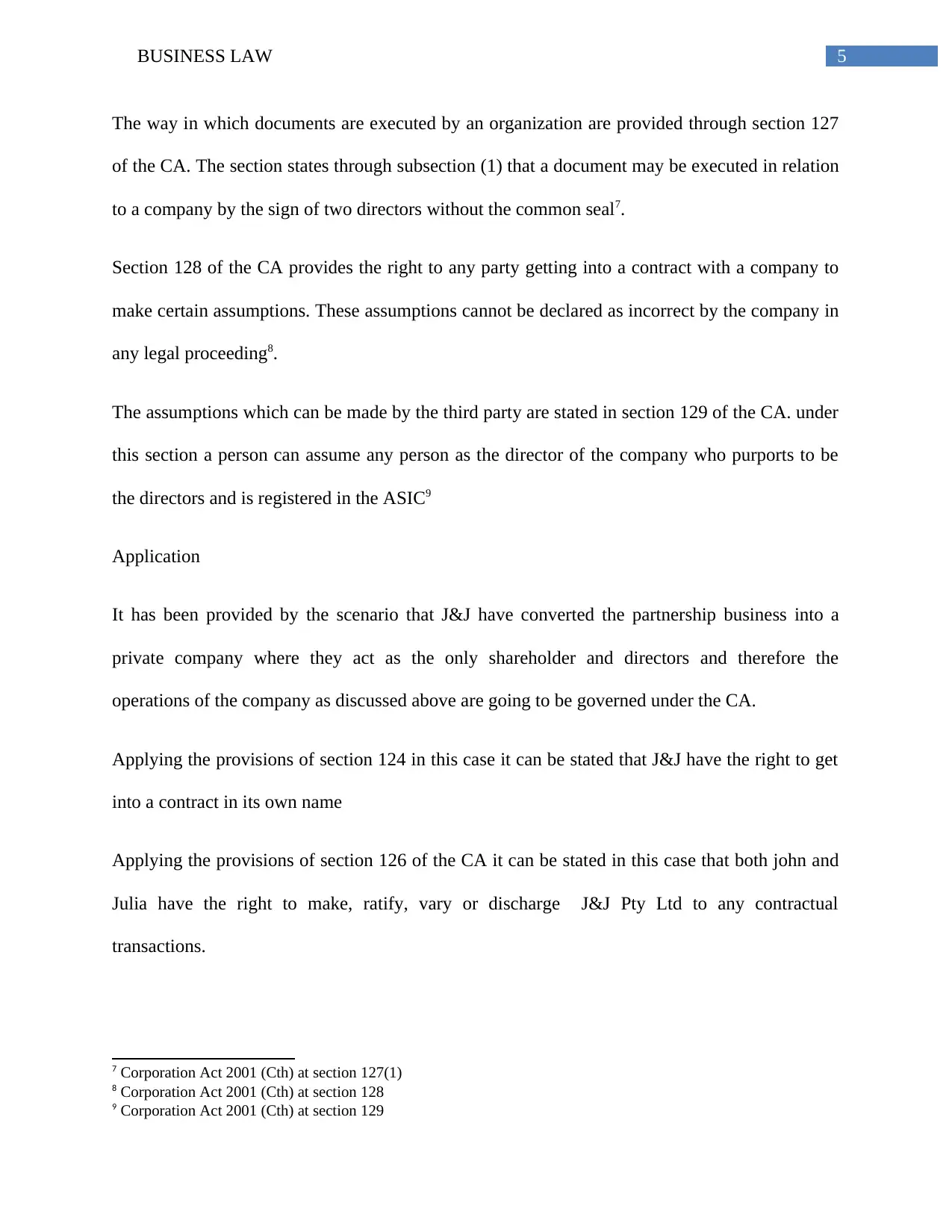
5BUSINESS LAW
The way in which documents are executed by an organization are provided through section 127
of the CA. The section states through subsection (1) that a document may be executed in relation
to a company by the sign of two directors without the common seal7.
Section 128 of the CA provides the right to any party getting into a contract with a company to
make certain assumptions. These assumptions cannot be declared as incorrect by the company in
any legal proceeding8.
The assumptions which can be made by the third party are stated in section 129 of the CA. under
this section a person can assume any person as the director of the company who purports to be
the directors and is registered in the ASIC9
Application
It has been provided by the scenario that J&J have converted the partnership business into a
private company where they act as the only shareholder and directors and therefore the
operations of the company as discussed above are going to be governed under the CA.
Applying the provisions of section 124 in this case it can be stated that J&J have the right to get
into a contract in its own name
Applying the provisions of section 126 of the CA it can be stated in this case that both john and
Julia have the right to make, ratify, vary or discharge J&J Pty Ltd to any contractual
transactions.
7 Corporation Act 2001 (Cth) at section 127(1)
8 Corporation Act 2001 (Cth) at section 128
9 Corporation Act 2001 (Cth) at section 129
The way in which documents are executed by an organization are provided through section 127
of the CA. The section states through subsection (1) that a document may be executed in relation
to a company by the sign of two directors without the common seal7.
Section 128 of the CA provides the right to any party getting into a contract with a company to
make certain assumptions. These assumptions cannot be declared as incorrect by the company in
any legal proceeding8.
The assumptions which can be made by the third party are stated in section 129 of the CA. under
this section a person can assume any person as the director of the company who purports to be
the directors and is registered in the ASIC9
Application
It has been provided by the scenario that J&J have converted the partnership business into a
private company where they act as the only shareholder and directors and therefore the
operations of the company as discussed above are going to be governed under the CA.
Applying the provisions of section 124 in this case it can be stated that J&J have the right to get
into a contract in its own name
Applying the provisions of section 126 of the CA it can be stated in this case that both john and
Julia have the right to make, ratify, vary or discharge J&J Pty Ltd to any contractual
transactions.
7 Corporation Act 2001 (Cth) at section 127(1)
8 Corporation Act 2001 (Cth) at section 128
9 Corporation Act 2001 (Cth) at section 129
⊘ This is a preview!⊘
Do you want full access?
Subscribe today to unlock all pages.

Trusted by 1+ million students worldwide
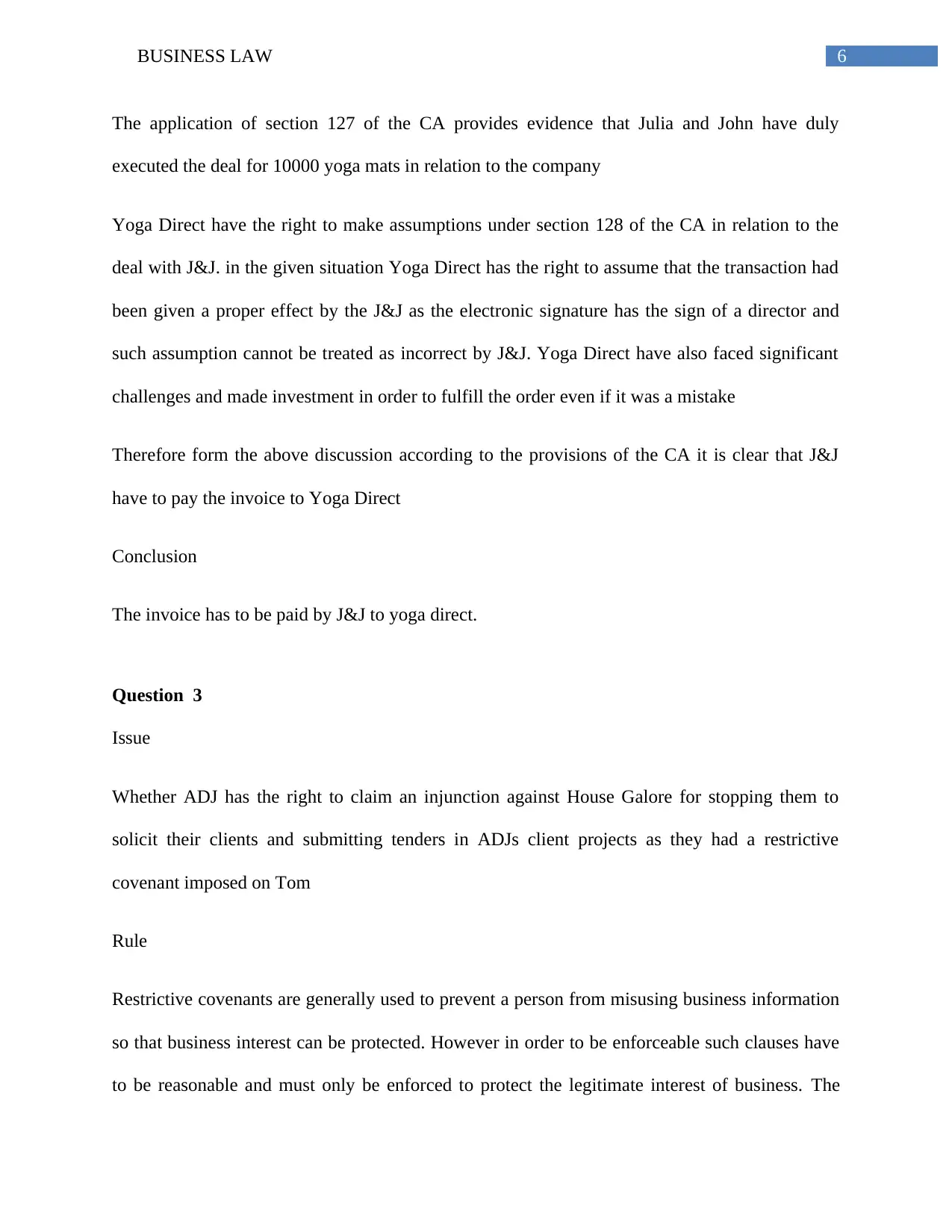
6BUSINESS LAW
The application of section 127 of the CA provides evidence that Julia and John have duly
executed the deal for 10000 yoga mats in relation to the company
Yoga Direct have the right to make assumptions under section 128 of the CA in relation to the
deal with J&J. in the given situation Yoga Direct has the right to assume that the transaction had
been given a proper effect by the J&J as the electronic signature has the sign of a director and
such assumption cannot be treated as incorrect by J&J. Yoga Direct have also faced significant
challenges and made investment in order to fulfill the order even if it was a mistake
Therefore form the above discussion according to the provisions of the CA it is clear that J&J
have to pay the invoice to Yoga Direct
Conclusion
The invoice has to be paid by J&J to yoga direct.
Question 3
Issue
Whether ADJ has the right to claim an injunction against House Galore for stopping them to
solicit their clients and submitting tenders in ADJs client projects as they had a restrictive
covenant imposed on Tom
Rule
Restrictive covenants are generally used to prevent a person from misusing business information
so that business interest can be protected. However in order to be enforceable such clauses have
to be reasonable and must only be enforced to protect the legitimate interest of business. The
The application of section 127 of the CA provides evidence that Julia and John have duly
executed the deal for 10000 yoga mats in relation to the company
Yoga Direct have the right to make assumptions under section 128 of the CA in relation to the
deal with J&J. in the given situation Yoga Direct has the right to assume that the transaction had
been given a proper effect by the J&J as the electronic signature has the sign of a director and
such assumption cannot be treated as incorrect by J&J. Yoga Direct have also faced significant
challenges and made investment in order to fulfill the order even if it was a mistake
Therefore form the above discussion according to the provisions of the CA it is clear that J&J
have to pay the invoice to Yoga Direct
Conclusion
The invoice has to be paid by J&J to yoga direct.
Question 3
Issue
Whether ADJ has the right to claim an injunction against House Galore for stopping them to
solicit their clients and submitting tenders in ADJs client projects as they had a restrictive
covenant imposed on Tom
Rule
Restrictive covenants are generally used to prevent a person from misusing business information
so that business interest can be protected. However in order to be enforceable such clauses have
to be reasonable and must only be enforced to protect the legitimate interest of business. The
Paraphrase This Document
Need a fresh take? Get an instant paraphrase of this document with our AI Paraphraser
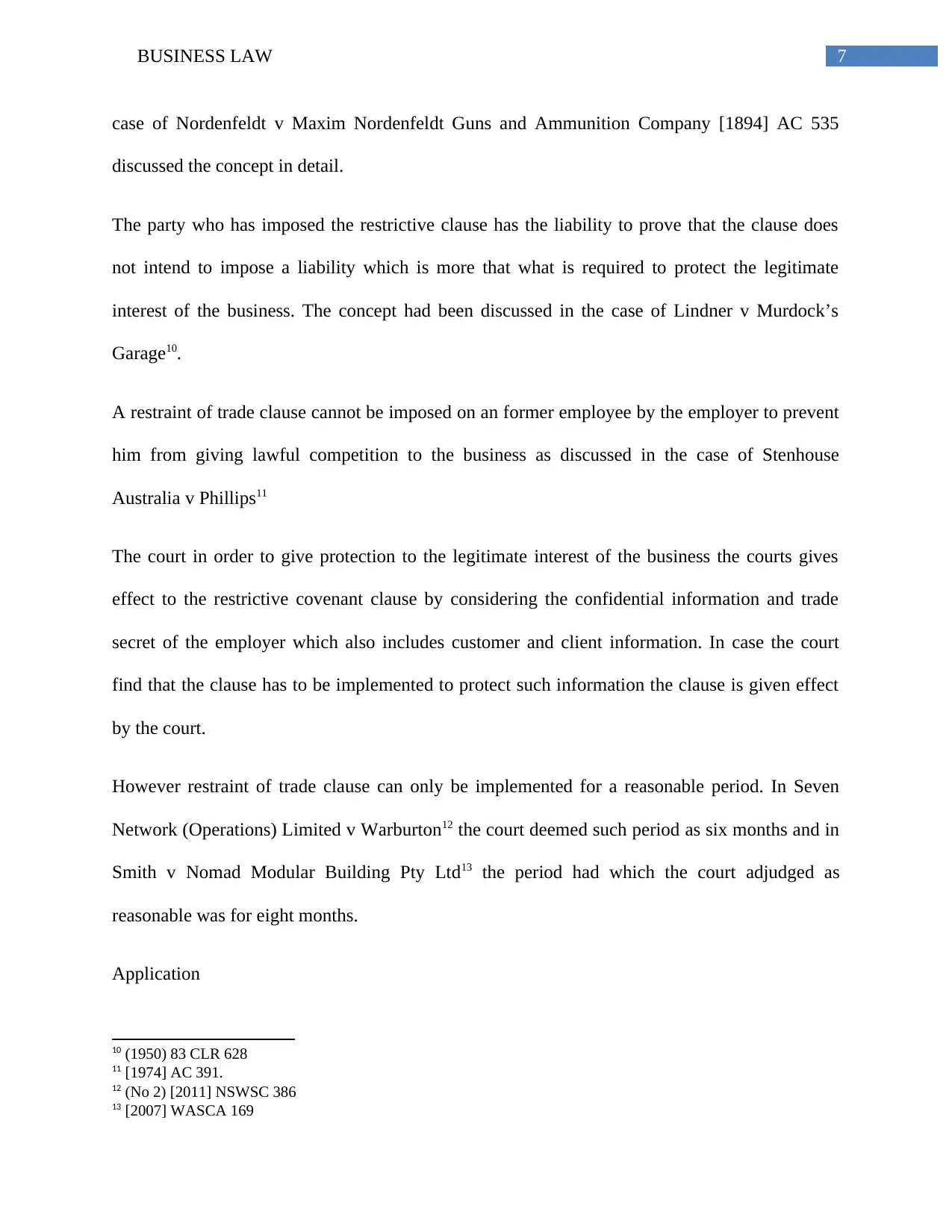
7BUSINESS LAW
case of Nordenfeldt v Maxim Nordenfeldt Guns and Ammunition Company [1894] AC 535
discussed the concept in detail.
The party who has imposed the restrictive clause has the liability to prove that the clause does
not intend to impose a liability which is more that what is required to protect the legitimate
interest of the business. The concept had been discussed in the case of Lindner v Murdock’s
Garage10.
A restraint of trade clause cannot be imposed on an former employee by the employer to prevent
him from giving lawful competition to the business as discussed in the case of Stenhouse
Australia v Phillips11
The court in order to give protection to the legitimate interest of the business the courts gives
effect to the restrictive covenant clause by considering the confidential information and trade
secret of the employer which also includes customer and client information. In case the court
find that the clause has to be implemented to protect such information the clause is given effect
by the court.
However restraint of trade clause can only be implemented for a reasonable period. In Seven
Network (Operations) Limited v Warburton12 the court deemed such period as six months and in
Smith v Nomad Modular Building Pty Ltd13 the period had which the court adjudged as
reasonable was for eight months.
Application
10 (1950) 83 CLR 628
11 [1974] AC 391.
12 (No 2) [2011] NSWSC 386
13 [2007] WASCA 169
case of Nordenfeldt v Maxim Nordenfeldt Guns and Ammunition Company [1894] AC 535
discussed the concept in detail.
The party who has imposed the restrictive clause has the liability to prove that the clause does
not intend to impose a liability which is more that what is required to protect the legitimate
interest of the business. The concept had been discussed in the case of Lindner v Murdock’s
Garage10.
A restraint of trade clause cannot be imposed on an former employee by the employer to prevent
him from giving lawful competition to the business as discussed in the case of Stenhouse
Australia v Phillips11
The court in order to give protection to the legitimate interest of the business the courts gives
effect to the restrictive covenant clause by considering the confidential information and trade
secret of the employer which also includes customer and client information. In case the court
find that the clause has to be implemented to protect such information the clause is given effect
by the court.
However restraint of trade clause can only be implemented for a reasonable period. In Seven
Network (Operations) Limited v Warburton12 the court deemed such period as six months and in
Smith v Nomad Modular Building Pty Ltd13 the period had which the court adjudged as
reasonable was for eight months.
Application
10 (1950) 83 CLR 628
11 [1974] AC 391.
12 (No 2) [2011] NSWSC 386
13 [2007] WASCA 169
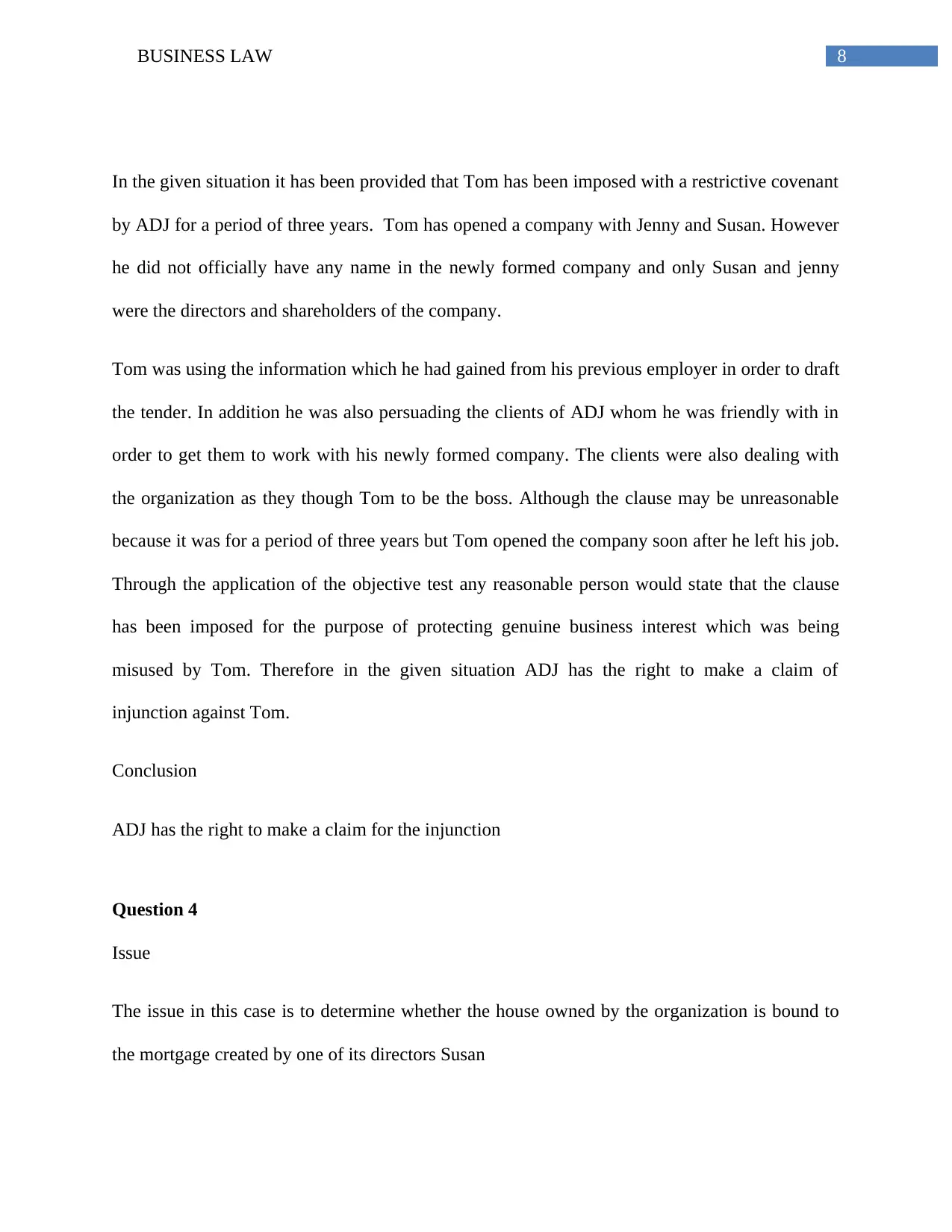
8BUSINESS LAW
In the given situation it has been provided that Tom has been imposed with a restrictive covenant
by ADJ for a period of three years. Tom has opened a company with Jenny and Susan. However
he did not officially have any name in the newly formed company and only Susan and jenny
were the directors and shareholders of the company.
Tom was using the information which he had gained from his previous employer in order to draft
the tender. In addition he was also persuading the clients of ADJ whom he was friendly with in
order to get them to work with his newly formed company. The clients were also dealing with
the organization as they though Tom to be the boss. Although the clause may be unreasonable
because it was for a period of three years but Tom opened the company soon after he left his job.
Through the application of the objective test any reasonable person would state that the clause
has been imposed for the purpose of protecting genuine business interest which was being
misused by Tom. Therefore in the given situation ADJ has the right to make a claim of
injunction against Tom.
Conclusion
ADJ has the right to make a claim for the injunction
Question 4
Issue
The issue in this case is to determine whether the house owned by the organization is bound to
the mortgage created by one of its directors Susan
In the given situation it has been provided that Tom has been imposed with a restrictive covenant
by ADJ for a period of three years. Tom has opened a company with Jenny and Susan. However
he did not officially have any name in the newly formed company and only Susan and jenny
were the directors and shareholders of the company.
Tom was using the information which he had gained from his previous employer in order to draft
the tender. In addition he was also persuading the clients of ADJ whom he was friendly with in
order to get them to work with his newly formed company. The clients were also dealing with
the organization as they though Tom to be the boss. Although the clause may be unreasonable
because it was for a period of three years but Tom opened the company soon after he left his job.
Through the application of the objective test any reasonable person would state that the clause
has been imposed for the purpose of protecting genuine business interest which was being
misused by Tom. Therefore in the given situation ADJ has the right to make a claim of
injunction against Tom.
Conclusion
ADJ has the right to make a claim for the injunction
Question 4
Issue
The issue in this case is to determine whether the house owned by the organization is bound to
the mortgage created by one of its directors Susan
⊘ This is a preview!⊘
Do you want full access?
Subscribe today to unlock all pages.

Trusted by 1+ million students worldwide
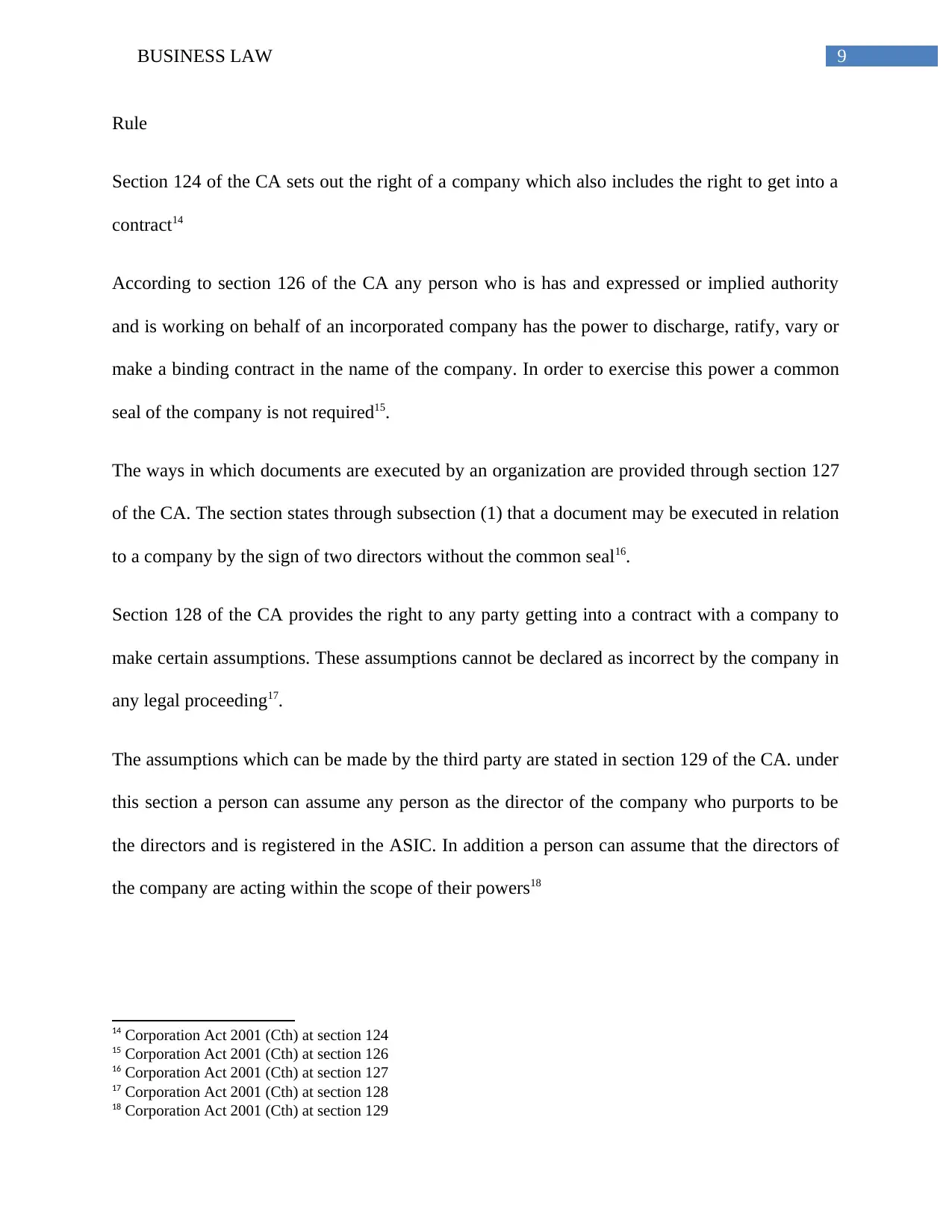
9BUSINESS LAW
Rule
Section 124 of the CA sets out the right of a company which also includes the right to get into a
contract14
According to section 126 of the CA any person who is has and expressed or implied authority
and is working on behalf of an incorporated company has the power to discharge, ratify, vary or
make a binding contract in the name of the company. In order to exercise this power a common
seal of the company is not required15.
The ways in which documents are executed by an organization are provided through section 127
of the CA. The section states through subsection (1) that a document may be executed in relation
to a company by the sign of two directors without the common seal16.
Section 128 of the CA provides the right to any party getting into a contract with a company to
make certain assumptions. These assumptions cannot be declared as incorrect by the company in
any legal proceeding17.
The assumptions which can be made by the third party are stated in section 129 of the CA. under
this section a person can assume any person as the director of the company who purports to be
the directors and is registered in the ASIC. In addition a person can assume that the directors of
the company are acting within the scope of their powers18
14 Corporation Act 2001 (Cth) at section 124
15 Corporation Act 2001 (Cth) at section 126
16 Corporation Act 2001 (Cth) at section 127
17 Corporation Act 2001 (Cth) at section 128
18 Corporation Act 2001 (Cth) at section 129
Rule
Section 124 of the CA sets out the right of a company which also includes the right to get into a
contract14
According to section 126 of the CA any person who is has and expressed or implied authority
and is working on behalf of an incorporated company has the power to discharge, ratify, vary or
make a binding contract in the name of the company. In order to exercise this power a common
seal of the company is not required15.
The ways in which documents are executed by an organization are provided through section 127
of the CA. The section states through subsection (1) that a document may be executed in relation
to a company by the sign of two directors without the common seal16.
Section 128 of the CA provides the right to any party getting into a contract with a company to
make certain assumptions. These assumptions cannot be declared as incorrect by the company in
any legal proceeding17.
The assumptions which can be made by the third party are stated in section 129 of the CA. under
this section a person can assume any person as the director of the company who purports to be
the directors and is registered in the ASIC. In addition a person can assume that the directors of
the company are acting within the scope of their powers18
14 Corporation Act 2001 (Cth) at section 124
15 Corporation Act 2001 (Cth) at section 126
16 Corporation Act 2001 (Cth) at section 127
17 Corporation Act 2001 (Cth) at section 128
18 Corporation Act 2001 (Cth) at section 129
Paraphrase This Document
Need a fresh take? Get an instant paraphrase of this document with our AI Paraphraser
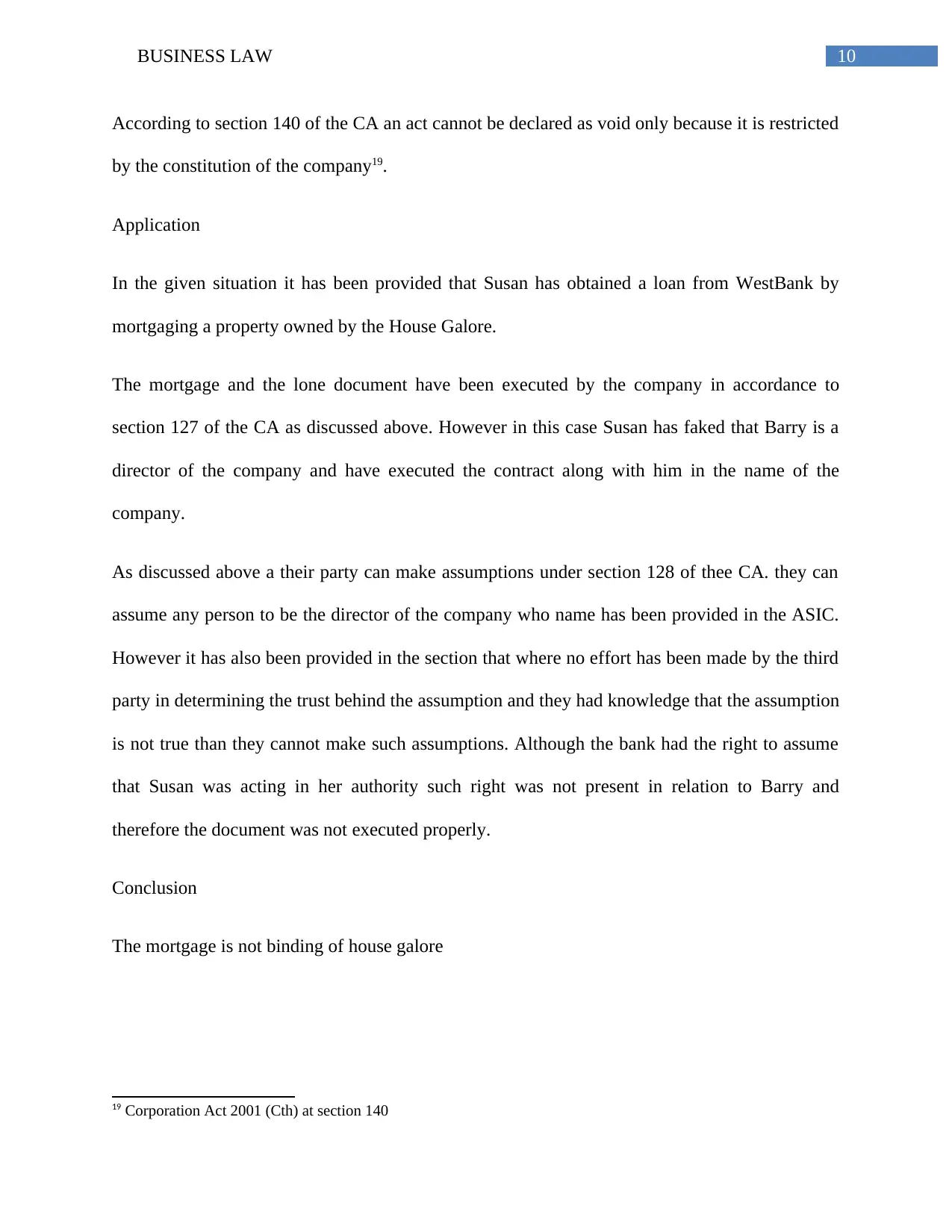
10BUSINESS LAW
According to section 140 of the CA an act cannot be declared as void only because it is restricted
by the constitution of the company19.
Application
In the given situation it has been provided that Susan has obtained a loan from WestBank by
mortgaging a property owned by the House Galore.
The mortgage and the lone document have been executed by the company in accordance to
section 127 of the CA as discussed above. However in this case Susan has faked that Barry is a
director of the company and have executed the contract along with him in the name of the
company.
As discussed above a their party can make assumptions under section 128 of thee CA. they can
assume any person to be the director of the company who name has been provided in the ASIC.
However it has also been provided in the section that where no effort has been made by the third
party in determining the trust behind the assumption and they had knowledge that the assumption
is not true than they cannot make such assumptions. Although the bank had the right to assume
that Susan was acting in her authority such right was not present in relation to Barry and
therefore the document was not executed properly.
Conclusion
The mortgage is not binding of house galore
19 Corporation Act 2001 (Cth) at section 140
According to section 140 of the CA an act cannot be declared as void only because it is restricted
by the constitution of the company19.
Application
In the given situation it has been provided that Susan has obtained a loan from WestBank by
mortgaging a property owned by the House Galore.
The mortgage and the lone document have been executed by the company in accordance to
section 127 of the CA as discussed above. However in this case Susan has faked that Barry is a
director of the company and have executed the contract along with him in the name of the
company.
As discussed above a their party can make assumptions under section 128 of thee CA. they can
assume any person to be the director of the company who name has been provided in the ASIC.
However it has also been provided in the section that where no effort has been made by the third
party in determining the trust behind the assumption and they had knowledge that the assumption
is not true than they cannot make such assumptions. Although the bank had the right to assume
that Susan was acting in her authority such right was not present in relation to Barry and
therefore the document was not executed properly.
Conclusion
The mortgage is not binding of house galore
19 Corporation Act 2001 (Cth) at section 140
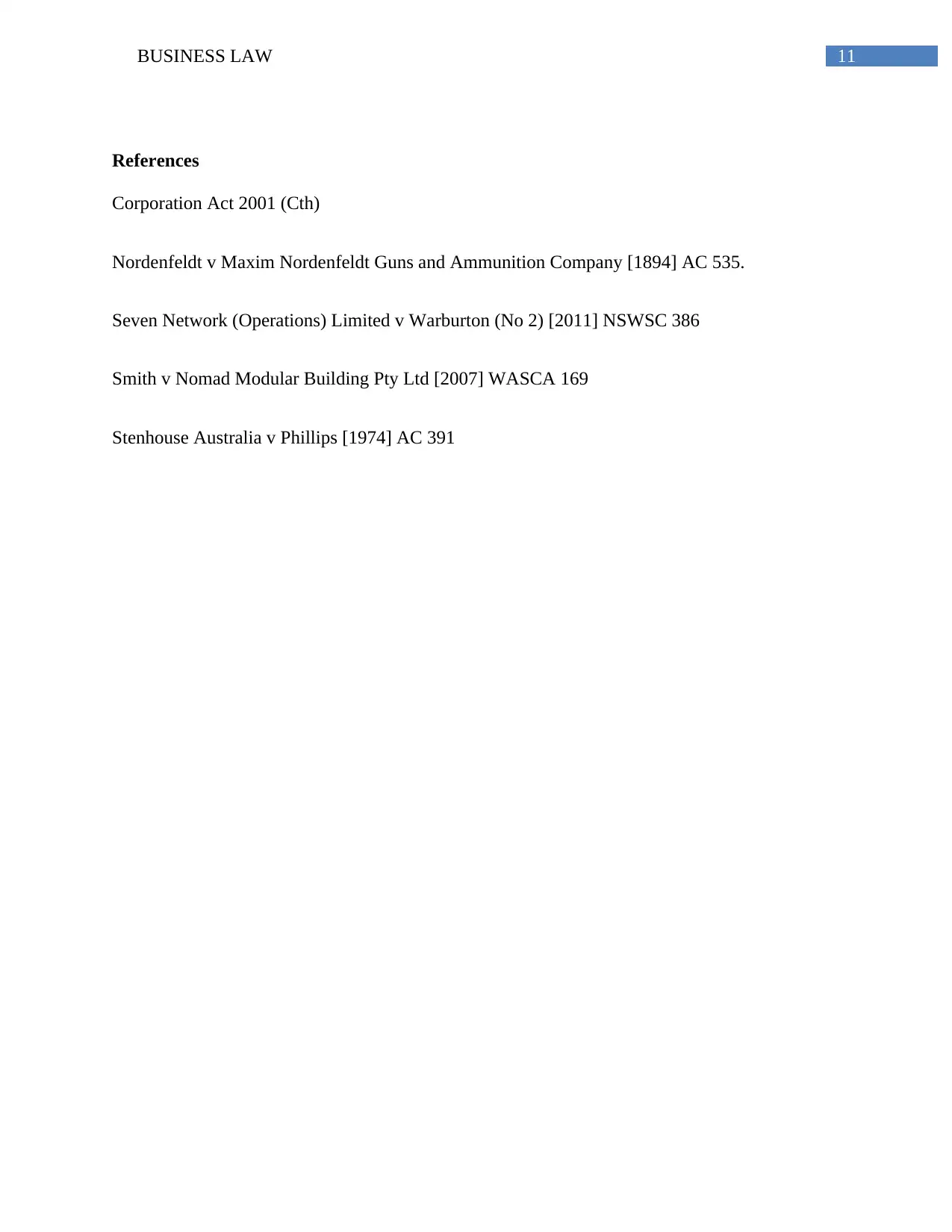
11BUSINESS LAW
References
Corporation Act 2001 (Cth)
Nordenfeldt v Maxim Nordenfeldt Guns and Ammunition Company [1894] AC 535.
Seven Network (Operations) Limited v Warburton (No 2) [2011] NSWSC 386
Smith v Nomad Modular Building Pty Ltd [2007] WASCA 169
Stenhouse Australia v Phillips [1974] AC 391
References
Corporation Act 2001 (Cth)
Nordenfeldt v Maxim Nordenfeldt Guns and Ammunition Company [1894] AC 535.
Seven Network (Operations) Limited v Warburton (No 2) [2011] NSWSC 386
Smith v Nomad Modular Building Pty Ltd [2007] WASCA 169
Stenhouse Australia v Phillips [1974] AC 391
⊘ This is a preview!⊘
Do you want full access?
Subscribe today to unlock all pages.

Trusted by 1+ million students worldwide
1 out of 12
Related Documents
Your All-in-One AI-Powered Toolkit for Academic Success.
+13062052269
info@desklib.com
Available 24*7 on WhatsApp / Email
![[object Object]](/_next/static/media/star-bottom.7253800d.svg)
Unlock your academic potential
Copyright © 2020–2026 A2Z Services. All Rights Reserved. Developed and managed by ZUCOL.




